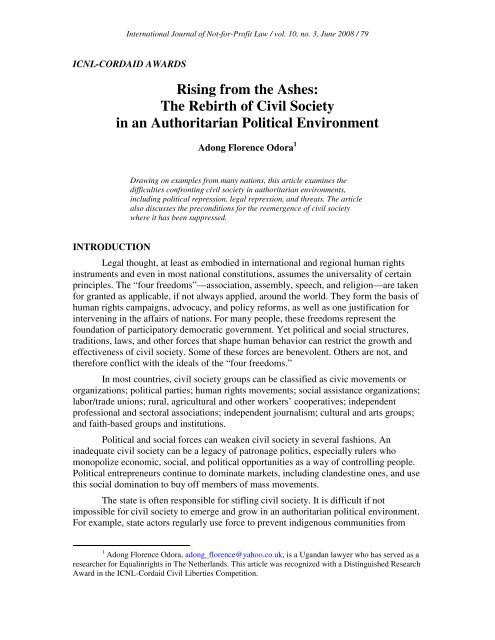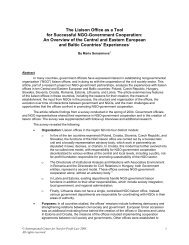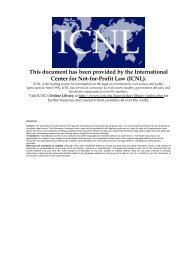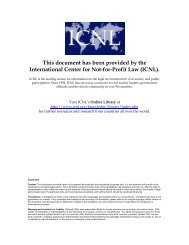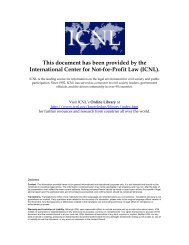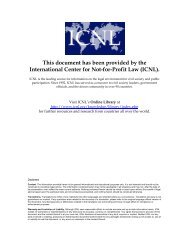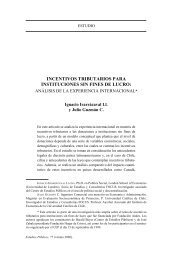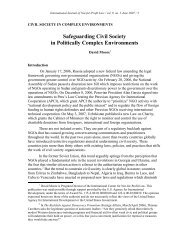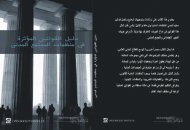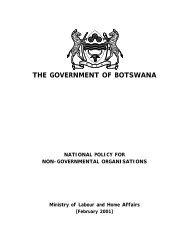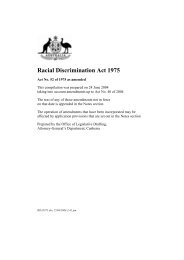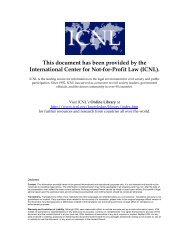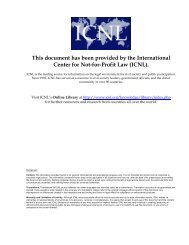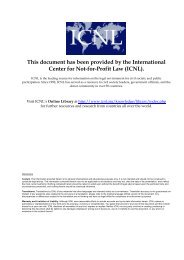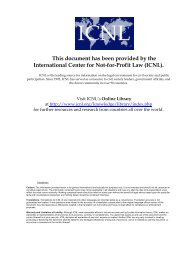Rising from the Ashes: The Rebirth of Civil Society in an ...
Rising from the Ashes: The Rebirth of Civil Society in an ...
Rising from the Ashes: The Rebirth of Civil Society in an ...
You also want an ePaper? Increase the reach of your titles
YUMPU automatically turns print PDFs into web optimized ePapers that Google loves.
International Journal <strong>of</strong> Not-for-Pr<strong>of</strong>it Law / vol. 10, no. 3, June 2008 / 79<br />
ICNL-CORDAID AWARDS<br />
<strong>Ris<strong>in</strong>g</strong> <strong>from</strong> <strong>the</strong> <strong>Ashes</strong>:<br />
<strong>The</strong> <strong>Rebirth</strong> <strong>of</strong> <strong>Civil</strong> <strong>Society</strong><br />
<strong>in</strong> <strong>an</strong> Authoritari<strong>an</strong> Political Environment<br />
Adong Florence Odora 1<br />
Draw<strong>in</strong>g on examples <strong>from</strong> m<strong>an</strong>y nations, this article exam<strong>in</strong>es <strong>the</strong><br />
difficulties confront<strong>in</strong>g civil society <strong>in</strong> authoritari<strong>an</strong> environments,<br />
<strong>in</strong>clud<strong>in</strong>g political repression, legal repression, <strong>an</strong>d threats. <strong>The</strong> article<br />
also discusses <strong>the</strong> preconditions for <strong>the</strong> reemergence <strong>of</strong> civil society<br />
where it has been suppressed.<br />
INTRODUCTION<br />
Legal thought, at least as embodied <strong>in</strong> <strong>in</strong>ternational <strong>an</strong>d regional hum<strong>an</strong> rights<br />
<strong>in</strong>struments <strong>an</strong>d even <strong>in</strong> most national constitutions, assumes <strong>the</strong> universality <strong>of</strong> certa<strong>in</strong><br />
pr<strong>in</strong>ciples. <strong>The</strong> “four freedoms”—association, assembly, speech, <strong>an</strong>d religion—are taken<br />
for gr<strong>an</strong>ted as applicable, if not always applied, around <strong>the</strong> world. <strong>The</strong>y form <strong>the</strong> basis <strong>of</strong><br />
hum<strong>an</strong> rights campaigns, advocacy, <strong>an</strong>d policy reforms, as well as one justification for<br />
<strong>in</strong>terven<strong>in</strong>g <strong>in</strong> <strong>the</strong> affairs <strong>of</strong> nations. For m<strong>an</strong>y people, <strong>the</strong>se freedoms represent <strong>the</strong><br />
foundation <strong>of</strong> participatory democratic government. Yet political <strong>an</strong>d social structures,<br />
traditions, laws, <strong>an</strong>d o<strong>the</strong>r forces that shape hum<strong>an</strong> behavior c<strong>an</strong> restrict <strong>the</strong> growth <strong>an</strong>d<br />
effectiveness <strong>of</strong> civil society. Some <strong>of</strong> <strong>the</strong>se forces are benevolent. O<strong>the</strong>rs are not, <strong>an</strong>d<br />
<strong>the</strong>refore conflict with <strong>the</strong> ideals <strong>of</strong> <strong>the</strong> “four freedoms.”<br />
In most countries, civil society groups c<strong>an</strong> be classified as civic movements or<br />
org<strong>an</strong>izations; political parties; hum<strong>an</strong> rights movements; social assist<strong>an</strong>ce org<strong>an</strong>izations;<br />
labor/trade unions; rural, agricultural <strong>an</strong>d o<strong>the</strong>r workers’ cooperatives; <strong>in</strong>dependent<br />
pr<strong>of</strong>essional <strong>an</strong>d sectoral associations; <strong>in</strong>dependent journalism; cultural <strong>an</strong>d arts groups;<br />
<strong>an</strong>d faith-based groups <strong>an</strong>d <strong>in</strong>stitutions.<br />
Political <strong>an</strong>d social forces c<strong>an</strong> weaken civil society <strong>in</strong> several fashions. An<br />
<strong>in</strong>adequate civil society c<strong>an</strong> be a legacy <strong>of</strong> patronage politics, especially rulers who<br />
monopolize economic, social, <strong>an</strong>d political opportunities as a way <strong>of</strong> controll<strong>in</strong>g people.<br />
Political entrepreneurs cont<strong>in</strong>ue to dom<strong>in</strong>ate markets, <strong>in</strong>clud<strong>in</strong>g cl<strong>an</strong>dest<strong>in</strong>e ones, <strong>an</strong>d use<br />
this social dom<strong>in</strong>ation to buy <strong>of</strong>f members <strong>of</strong> mass movements.<br />
<strong>The</strong> state is <strong>of</strong>ten responsible for stifl<strong>in</strong>g civil society. It is difficult if not<br />
impossible for civil society to emerge <strong>an</strong>d grow <strong>in</strong> <strong>an</strong> authoritari<strong>an</strong> political environment.<br />
For example, state actors regularly use force to prevent <strong>in</strong>digenous communities <strong>from</strong><br />
1 Adong Florence Odora, adong_florence@yahoo.co.uk, is a Ug<strong>an</strong>d<strong>an</strong> lawyer who has served as a<br />
researcher for Equal<strong>in</strong>rights <strong>in</strong> <strong>The</strong> Ne<strong>the</strong>rl<strong>an</strong>ds. This article was recognized with a Dist<strong>in</strong>guished Research<br />
Award <strong>in</strong> <strong>the</strong> ICNL-Cordaid <strong>Civil</strong> Liberties Competition.
International Journal <strong>of</strong> Not-for-Pr<strong>of</strong>it Law / vol. 10, no. 3, June 2008 / 80<br />
org<strong>an</strong>iz<strong>in</strong>g on sufficient scale to defend <strong>the</strong>ir <strong>in</strong>terests. Without freedom <strong>of</strong> association,<br />
civil society c<strong>an</strong>not exist.<br />
Why do rulers underm<strong>in</strong>e civil society Some are par<strong>an</strong>oid <strong>an</strong>d will do <strong>an</strong>yth<strong>in</strong>g<br />
to safeguard <strong>the</strong>ir <strong>in</strong>terests. This is especially true where <strong>the</strong>re are <strong>in</strong>dications <strong>of</strong> possible<br />
military or social upris<strong>in</strong>g aga<strong>in</strong>st <strong>the</strong> government. In o<strong>the</strong>r cases, a state c<strong>an</strong> exploit<br />
divisions <strong>in</strong> politics. For example, <strong>the</strong> citizens <strong>of</strong> m<strong>an</strong>y states c<strong>an</strong>not reach a consensus on<br />
how <strong>the</strong> state should be governed. This is especially true <strong>in</strong> Africa, as well as <strong>in</strong> <strong>the</strong><br />
former Soviet Union, Lat<strong>in</strong> America, <strong>an</strong>d Central Asia.<br />
A country’s political environment def<strong>in</strong>es <strong>the</strong> spaces <strong>an</strong>d <strong>the</strong> issues on which<br />
nongovernmental org<strong>an</strong>izations (NGOs) <strong>an</strong>d civil society org<strong>an</strong>izations (CSOs) c<strong>an</strong><br />
operate <strong>an</strong>d adv<strong>an</strong>ce. This article explores how <strong>the</strong>se restrictions play out <strong>in</strong> less-th<strong>an</strong>democratic<br />
states, <strong>an</strong>d how civil society c<strong>an</strong> sometimes endure <strong>an</strong>d ultimately reemerge.<br />
THE POLITICAL AND LEGAL MILIEU WITHIN WHICH CSOs OPERATE<br />
In democratiz<strong>in</strong>g countries, civil society should ideally function as a school <strong>in</strong><br />
which citizens learn democratic th<strong>in</strong>k<strong>in</strong>g <strong>an</strong>d act<strong>in</strong>g, toler<strong>an</strong>ce <strong>of</strong> diversity <strong>an</strong>d pluralism,<br />
mutual accept<strong>an</strong>ce, will<strong>in</strong>gness to compromise, trust, <strong>an</strong>d cooperation. <strong>Civil</strong> society<br />
org<strong>an</strong>izations should serve as advocates, <strong>in</strong>fluenc<strong>in</strong>g government both to adopt positions<br />
supported by <strong>the</strong>ir members <strong>an</strong>d to follow rules that facilitate open, free, <strong>an</strong>d fair political<br />
debate <strong>an</strong>d decisions. Thus, a crucial element <strong>of</strong> democratization is <strong>the</strong> creation <strong>of</strong><br />
org<strong>an</strong>izations that c<strong>an</strong> act <strong>in</strong>dependently <strong>an</strong>d confront <strong>the</strong> government, ei<strong>the</strong>r to hold it to<br />
account or to <strong>in</strong>fluence policy.<br />
Constricted political space, however, commonly limits CSOs to matters outside<br />
<strong>the</strong> explicit political arena, <strong>in</strong>clud<strong>in</strong>g democracy <strong>an</strong>d democratization. On this po<strong>in</strong>t,<br />
Oloka-Ony<strong>an</strong>go (2000, p. 23) rightly ponders whe<strong>the</strong>r genu<strong>in</strong>e democracy c<strong>an</strong> be realized<br />
<strong>in</strong> a political framework that monopolizes discussions <strong>of</strong> govern<strong>an</strong>ce, suppresses<br />
org<strong>an</strong>ized opposition, <strong>an</strong>d curtails political space.<br />
Such a framework has several consequences. M<strong>an</strong>y CSO <strong>of</strong>ficials admit that <strong>the</strong>y<br />
do not w<strong>an</strong>t to confront a repressive government; o<strong>the</strong>rs say that <strong>the</strong>y wish to avoid<br />
matters considered controversial. As such, m<strong>an</strong>y CSOs avoid democratization <strong>an</strong>d<br />
govern<strong>an</strong>ce issues <strong>an</strong>d dwell on “s<strong>of</strong>t issues,” such as women <strong>an</strong>d children’s rights <strong>an</strong>d<br />
developmental topics. <strong>The</strong> suppression <strong>of</strong> dissent also expla<strong>in</strong>s why governments are<br />
more receptive to service-provid<strong>in</strong>g CSOs th<strong>an</strong> to advocacy ones. Restrictions imposed<br />
by exist<strong>in</strong>g law, as well as potential restrictions embodied <strong>in</strong> pend<strong>in</strong>g legislation, fur<strong>the</strong>r<br />
keep CSOs <strong>an</strong>d NGOs on a short leash. Taken toge<strong>the</strong>r, <strong>the</strong>se factors forestall free<br />
discussions <strong>of</strong> political matters, <strong>an</strong>d <strong>the</strong>reby prevent civil society <strong>from</strong> play<strong>in</strong>g its proper<br />
role as <strong>in</strong>termediary between groups <strong>of</strong> citizens <strong>an</strong>d <strong>the</strong> wielders <strong>of</strong> political power.<br />
Ug<strong>an</strong>da provides a useful case study. Ug<strong>an</strong>d<strong>an</strong> CSOs are relatively young. Most<br />
<strong>of</strong> <strong>the</strong>m were founded after <strong>the</strong> NRM regime captured power <strong>in</strong> 1986. Most <strong>of</strong> <strong>the</strong>se<br />
org<strong>an</strong>izations, fur<strong>the</strong>r, have a narrow social base <strong>an</strong>d th<strong>in</strong> geographical coverage. In<br />
particular, most lead<strong>in</strong>g CSOs are concentrated <strong>in</strong> Kampala, <strong>the</strong> capital <strong>of</strong> Ug<strong>an</strong>da, <strong>an</strong>d<br />
conduct only limited activities elsewhere. <strong>The</strong> middle class plays a prom<strong>in</strong>ent role <strong>in</strong> <strong>the</strong><br />
most visible org<strong>an</strong>izations, too. F<strong>in</strong>ally, <strong>the</strong> bulk <strong>of</strong> CSOs are <strong>in</strong>volved <strong>in</strong> service delivery<br />
<strong>an</strong>d o<strong>the</strong>r relatively uncontroversial activities.
International Journal <strong>of</strong> Not-for-Pr<strong>of</strong>it Law / vol. 10, no. 3, June 2008 / 81<br />
Ug<strong>an</strong>da does provide relative leeway for form<strong>in</strong>g <strong>an</strong>d operat<strong>in</strong>g CSOs, as well as<br />
a relatively free press. None<strong>the</strong>less, advocacy CSOs face a difficult time, because <strong>of</strong><br />
restrictions on political spaces. CSOs active on issues <strong>of</strong> democratization, govern<strong>an</strong>ce,<br />
hum<strong>an</strong> rights, <strong>an</strong>d accountability are especially affected. Consequently, civil society is<br />
largely limited to topics <strong>an</strong>d approaches that re<strong>in</strong>force <strong>the</strong> status quo, or at least pose no<br />
threat to it.<br />
Before 1986, Ug<strong>an</strong>da was marked by tyr<strong>an</strong>nical regimes <strong>an</strong>d economic collapse.<br />
Although <strong>the</strong> political environment has improved, <strong>the</strong> present regime does not seem fully<br />
committed to democracy. <strong>The</strong> government cont<strong>in</strong>ues to restrict political pluralism <strong>an</strong>d<br />
shows <strong>in</strong>toler<strong>an</strong>ce toward serious political competition. On m<strong>an</strong>y occasions, <strong>the</strong><br />
government has prevented CSOs <strong>from</strong> adv<strong>an</strong>c<strong>in</strong>g democratization <strong>an</strong>d govern<strong>an</strong>ce goals.<br />
Now, a proposed NGO Registration (Amendment) Bill threatens to impose new<br />
regulations on <strong>the</strong> registration <strong>an</strong>d activities <strong>of</strong> CSOs. This problem is compounded by a<br />
reluct<strong>an</strong>ce <strong>of</strong> CSOs to confront <strong>the</strong> state on certa<strong>in</strong> issues. For <strong>the</strong>se reasons, CSOs<br />
rema<strong>in</strong> largely outside <strong>the</strong> arenas <strong>of</strong> politics <strong>an</strong>d democratization.<br />
<strong>The</strong> classic model <strong>of</strong> civil society requires a me<strong>an</strong><strong>in</strong>gful <strong>in</strong>stitutional separation<br />
between citizens <strong>an</strong>d <strong>the</strong>ir org<strong>an</strong>izations, on <strong>the</strong> one h<strong>an</strong>d, <strong>an</strong>d a relatively autonomous<br />
bureaucratic state, on <strong>the</strong> o<strong>the</strong>r. Sub-Sahar<strong>an</strong> Africa does not satisfy that requirement,<br />
accord<strong>in</strong>g to Patrick Chabal (Chabal <strong>an</strong>d Daloz, 1999). <strong>The</strong>re, no sharp dichotomy c<strong>an</strong> be<br />
drawn between state <strong>an</strong>d civil society. Ra<strong>the</strong>r, <strong>the</strong> two <strong>in</strong>terpenetrate each o<strong>the</strong>r.<br />
Chabal argues that Afric<strong>an</strong> societies are essentially plural, fragmented, <strong>an</strong>d above<br />
all, org<strong>an</strong>ized along vertical l<strong>in</strong>es Sociopolitical cleavages usually reflect factional<br />
divisions, which arise primarily because <strong>of</strong> competition for scarce resources. In general,<br />
vertical divisions rema<strong>in</strong> more signific<strong>an</strong>t th<strong>an</strong> horizontal bonds or ties <strong>of</strong> solidarity<br />
between those who are similarly employed or pr<strong>of</strong>essionally l<strong>in</strong>ked. That helps limit <strong>the</strong><br />
effectiveness <strong>of</strong> associations charged with promot<strong>in</strong>g <strong>the</strong> common good. Chabal holds<br />
that questions <strong>of</strong> identity or community <strong>of</strong>ten underm<strong>in</strong>e attempts at occupational or<br />
pr<strong>of</strong>essional unity, <strong>an</strong>d fur<strong>the</strong>r, that <strong>the</strong> bus<strong>in</strong>ess <strong>of</strong> politics is usually conducted along<br />
<strong>in</strong>formal, vertical ch<strong>an</strong>nels l<strong>in</strong>k<strong>in</strong>g <strong>the</strong> elites with <strong>the</strong> rest <strong>of</strong> <strong>the</strong> population, such as<br />
patron-client networks <strong>an</strong>d communal org<strong>an</strong>izations. <strong>The</strong> primacy <strong>of</strong> vertical <strong>an</strong>d<br />
personalized ties precludes a functional civil society. Assertions that civil society exists<br />
<strong>in</strong> sub-Sahar<strong>an</strong> Africa derive more <strong>from</strong> wishful th<strong>in</strong>k<strong>in</strong>g or ideological bias th<strong>an</strong> <strong>from</strong> a<br />
careful <strong>an</strong>alysis <strong>of</strong> conditions.<br />
Fur<strong>the</strong>r, such assertions suggest that Afric<strong>an</strong> political systems are more similar to<br />
<strong>the</strong>ir Western counterparts th<strong>an</strong> <strong>the</strong>y really are. It is mislead<strong>in</strong>g to talk <strong>of</strong> a politically<br />
salient cleavage between “state” <strong>an</strong>d (civil) “society.” Instead <strong>of</strong> focus<strong>in</strong>g on such vague<br />
categories, one should pay attention to <strong>the</strong> behavior <strong>of</strong> <strong>the</strong> ma<strong>in</strong> political actors. Private<br />
<strong>an</strong>d public doma<strong>in</strong>s blur, <strong>an</strong>d <strong>the</strong> few embryonic societal movements oppos<strong>in</strong>g central<br />
power are limited <strong>in</strong> <strong>the</strong>ir org<strong>an</strong>izational capacities.<br />
Chabal's po<strong>in</strong>ts apply to Ug<strong>an</strong>da. Vertical relations <strong>an</strong>d bonds <strong>of</strong> patronage are<br />
common, <strong>an</strong>d <strong>the</strong>y help expla<strong>in</strong> why civil society actors hardly ever challenge <strong>the</strong> state.<br />
In addition, <strong>the</strong> distribution <strong>of</strong> socioeconomic resources is highly unequal <strong>in</strong> Ug<strong>an</strong>da. As<br />
a result, <strong>the</strong> system <strong>of</strong> political coord<strong>in</strong>ation tends to produce a “mobilization <strong>of</strong> bias” <strong>an</strong>d<br />
<strong>the</strong>reby provides opportunities for powerful elites to <strong>in</strong>fluence policy by <strong>in</strong>teract<strong>in</strong>g with
International Journal <strong>of</strong> Not-for-Pr<strong>of</strong>it Law / vol. 10, no. 3, June 2008 / 82<br />
<strong>the</strong>ir political <strong>an</strong>d governmental counterparts. <strong>The</strong> proliferation <strong>of</strong> NGOs <strong>in</strong> Ug<strong>an</strong>da is<br />
not evidence to <strong>the</strong> contrary. It reflects donors’ practice <strong>of</strong> ch<strong>an</strong>nel<strong>in</strong>g more resources<br />
outside <strong>the</strong> state, not <strong>an</strong> <strong>in</strong>creased political import<strong>an</strong>ce <strong>of</strong> civil society.<br />
<strong>The</strong> experience <strong>of</strong> some countries suggests that civil society c<strong>an</strong> exist even though<br />
it does not follow <strong>the</strong> classic model. Under this <strong>the</strong>ory, civil society need not be totally<br />
<strong>in</strong>dependent <strong>from</strong> <strong>the</strong> government; <strong>the</strong> key is to m<strong>an</strong>age <strong>the</strong> relationship between civil<br />
society <strong>an</strong>d political power. In Spa<strong>in</strong> as well as some former communist countries, civil<br />
society once me<strong>an</strong>t political society, though it now refers to <strong>the</strong> network <strong>of</strong> voluntary<br />
associations, markets, <strong>an</strong>d public spaces outside <strong>the</strong> direct control <strong>of</strong> <strong>the</strong> state. For Perez-<br />
Diaz this dist<strong>in</strong>ction is critical, because a civil society c<strong>an</strong> be fostered, <strong>in</strong> a limited sense<br />
at least, by <strong>the</strong> state.<br />
LEGAL FRAMEWORK APPLICABLE TO CIVIL SOCIETY ORGANIZATIONS<br />
Repressive governments <strong>of</strong>ten closely regulate <strong>the</strong> registration process for CSOs,<br />
<strong>an</strong>d <strong>the</strong>reby discourage <strong>the</strong> formation <strong>of</strong> org<strong>an</strong>izations, particularly advocacy groups.<br />
Tactics <strong>in</strong>clude exercis<strong>in</strong>g vast discretion over registration; mak<strong>in</strong>g registration<br />
expensive, <strong>in</strong>convenient, or burdensome; delay<strong>in</strong>g registration decisions unduly; <strong>an</strong>d<br />
requir<strong>in</strong>g org<strong>an</strong>izations to reregister every few years, allow<strong>in</strong>g <strong>the</strong> government to revisit<br />
<strong>the</strong> issue <strong>of</strong> whe<strong>the</strong>r a given org<strong>an</strong>ization should exist.<br />
In Azerbaij<strong>an</strong>, Ethiopia, <strong>an</strong>d Algeria, regulations govern<strong>in</strong>g registration are vague<br />
<strong>an</strong>d leave great discretion to <strong>the</strong> <strong>of</strong>ficials. CSOs are sometimes denied registration, <strong>an</strong>d<br />
o<strong>the</strong>r times subjected to long delays or repeated requests for <strong>in</strong>formation. In Azerbaij<strong>an</strong>,<br />
registrations have been de facto suspended as a result <strong>of</strong> poor implementation <strong>of</strong> <strong>the</strong><br />
registration laws.<br />
In Belarus, <strong>the</strong> government <strong>in</strong> recent years has adopted a series <strong>of</strong> laws restrict<strong>in</strong>g<br />
both public ga<strong>the</strong>r<strong>in</strong>gs <strong>an</strong>d CSO activity. Among o<strong>the</strong>r powers, <strong>the</strong> laws give <strong>the</strong><br />
government subst<strong>an</strong>tial discretion over registration. A National Commission on<br />
Registration <strong>of</strong> Public Associations advises <strong>the</strong> M<strong>in</strong>istry <strong>of</strong> Justice on whe<strong>the</strong>r <strong>an</strong><br />
org<strong>an</strong>ization should be permitted to register, <strong>in</strong> a process that is not tr<strong>an</strong>sparent.<br />
Applic<strong>an</strong>ts have waited for more th<strong>an</strong> a year for a response to <strong>the</strong>ir applications (<strong>the</strong> law<br />
provides for one month), only to be denied registration without expl<strong>an</strong>ation.<br />
Except for its restrictions on political parties under <strong>the</strong> Constitution <strong>an</strong>d <strong>the</strong> laws<br />
on sedition, Ug<strong>an</strong>da’s legal framework at first appears to provide sufficient space for<br />
form<strong>in</strong>g <strong>an</strong>d operat<strong>in</strong>g CSOs. <strong>The</strong> constitutional framework supports <strong>the</strong> existence <strong>an</strong>d<br />
free operation <strong>of</strong> civil society org<strong>an</strong>izations. CSOs <strong>in</strong> Ug<strong>an</strong>da generally operate under <strong>the</strong><br />
1995 Constitution <strong>of</strong> Ug<strong>an</strong>da, which guar<strong>an</strong>tees <strong>the</strong> right <strong>of</strong> association <strong>an</strong>d recognizes<br />
<strong>the</strong> existence <strong>an</strong>d role <strong>of</strong> civil society org<strong>an</strong>izations. <strong>The</strong> relev<strong>an</strong>t constitutional<br />
provisions are as follows (emphasis added):<br />
Pr<strong>in</strong>ciple 5 (ii) <strong>of</strong> <strong>the</strong> National Objectives <strong>an</strong>d Directive Pr<strong>in</strong>ciples <strong>of</strong> State Policy<br />
provides that “<strong>the</strong> state shall guar<strong>an</strong>tee <strong>an</strong>d respect <strong>the</strong> <strong>in</strong>dependence <strong>of</strong><br />
nongovernmental org<strong>an</strong>izations which protect <strong>an</strong>d promote hum<strong>an</strong> rights.”<br />
Article 29(1) provides for “<strong>the</strong> freedom <strong>of</strong> association which shall <strong>in</strong>clude <strong>the</strong><br />
freedom to form <strong>an</strong>d jo<strong>in</strong> association or unions, <strong>in</strong>clud<strong>in</strong>g trade unions <strong>an</strong>d<br />
political <strong>an</strong>d o<strong>the</strong>r civic org<strong>an</strong>izations.”
International Journal <strong>of</strong> Not-for-Pr<strong>of</strong>it Law / vol. 10, no. 3, June 2008 / 83<br />
Article 38(2) provides that “every Ug<strong>an</strong>d<strong>an</strong> has a right to participate <strong>in</strong> peaceful<br />
activities to <strong>in</strong>fluence <strong>the</strong> policies <strong>of</strong> Government through civic org<strong>an</strong>izations.”<br />
Article 269 provides for limit<strong>in</strong>g certa<strong>in</strong> activities <strong>of</strong> political org<strong>an</strong>izations,<br />
which was tr<strong>an</strong>slated <strong>in</strong>to <strong>the</strong> exasperat<strong>in</strong>g Political Org<strong>an</strong>izations Act. <strong>The</strong><br />
restrictions aga<strong>in</strong>st political org<strong>an</strong>izations <strong>in</strong> <strong>the</strong>se laws <strong>in</strong>clude rules aga<strong>in</strong>st<br />
operat<strong>in</strong>g br<strong>an</strong>ch <strong>of</strong>fices, hold<strong>in</strong>g public rallies, <strong>an</strong>d conduct<strong>in</strong>g <strong>an</strong>y activities that<br />
may <strong>in</strong>terfere with <strong>the</strong> Movement political system for <strong>the</strong> time be<strong>in</strong>g. Because <strong>of</strong><br />
<strong>the</strong> restrictions, <strong>the</strong> traditional political parties operate more or less like CSOs,<br />
<strong>in</strong>clud<strong>in</strong>g <strong>The</strong> Free Movement (TFM), <strong>the</strong> Forum for Democratic Ch<strong>an</strong>ge (FDC),<br />
<strong>an</strong>d Ug<strong>an</strong>da Peoples’ Congress <strong>an</strong>d Democratic Party, which oppose <strong>the</strong><br />
hegemony <strong>of</strong> <strong>the</strong> Movement <strong>an</strong>d take political st<strong>an</strong>ces. <strong>The</strong> constitutional article<br />
<strong>an</strong>d <strong>the</strong> Act have been widely condemned by <strong>the</strong> opposition parties, which<br />
consider <strong>the</strong>m to violate fundamental freedoms <strong>of</strong> association <strong>an</strong>d expression.<br />
Besides <strong>the</strong> Constitution, CSOs are governed by <strong>the</strong> NGO Registration Statute<br />
1989. This statute provides for <strong>the</strong> registration <strong>an</strong>d regulation <strong>of</strong> NGOs. It def<strong>in</strong>es <strong>an</strong><br />
NGO as “a Non-Governmental Org<strong>an</strong>ization established to provide voluntary services<br />
<strong>in</strong>clud<strong>in</strong>g religious, educational, literary, scientific, social, or charitable services to <strong>the</strong><br />
community or <strong>an</strong>y part <strong>the</strong>re<strong>of</strong>” (Ug<strong>an</strong>d<strong>an</strong> NGO Registration Statute No. 5, 1989, Section<br />
13). <strong>The</strong> statute fur<strong>the</strong>r provides that no org<strong>an</strong>ization c<strong>an</strong> operate <strong>in</strong> Ug<strong>an</strong>da unless it has<br />
registered with <strong>the</strong> Board, subject to such conditions <strong>an</strong>d directions as <strong>the</strong> Board may<br />
th<strong>in</strong>k fit.<br />
However, <strong>the</strong> government has tabled bills that threaten to limit <strong>the</strong> general<br />
freedom <strong>an</strong>d operations <strong>of</strong> CSOs. <strong>The</strong>se bills address <strong>the</strong> suppression <strong>of</strong> terrorism, <strong>the</strong><br />
registration <strong>of</strong> NGOs, <strong>an</strong>d <strong>the</strong> regulation <strong>of</strong> political parties:<br />
<strong>The</strong> Bill on <strong>the</strong> Suppression <strong>of</strong> Terrorism 2001 conta<strong>in</strong>s several provisions that<br />
threaten fundamental freedoms <strong>of</strong> expression <strong>an</strong>d liberty. In its present form, <strong>the</strong><br />
bill is <strong>in</strong>imical to hum<strong>an</strong> rights <strong>in</strong> general, <strong>an</strong>d it potentially end<strong>an</strong>gers <strong>in</strong>dividuals<br />
<strong>an</strong>d groups <strong>in</strong> <strong>the</strong> opposition. <strong>The</strong> proposed law exp<strong>an</strong>ds <strong>the</strong> def<strong>in</strong>ition <strong>of</strong><br />
terrorism <strong>an</strong>d <strong>in</strong>creases <strong>the</strong> number <strong>of</strong> <strong>of</strong>fenses related to terrorism; imposes a<br />
m<strong>an</strong>datory sentence <strong>of</strong> death for <strong>the</strong> <strong>of</strong>fense <strong>of</strong> terrorism <strong>an</strong>d raises <strong>the</strong> penalties<br />
for <strong>of</strong>fenses related to it, <strong>in</strong>clud<strong>in</strong>g <strong>the</strong> forfeiture <strong>of</strong> assets <strong>an</strong>d o<strong>the</strong>r property<br />
belong<strong>in</strong>g to associations deemed terrorist groups; <strong>in</strong>creases m<strong>in</strong>isterial powers to<br />
declare org<strong>an</strong>izations terrorist; <strong>in</strong>troduces wide powers for surveill<strong>an</strong>ce <strong>an</strong>d<br />
<strong>in</strong>terception <strong>of</strong> communications, even without <strong>an</strong>y evidence that <strong>the</strong> <strong>in</strong>dividuals<br />
affected are <strong>in</strong>volved <strong>in</strong> terrorist activities; <strong>an</strong>d <strong>in</strong>troduces <strong>an</strong> <strong>of</strong>fense for<br />
display<strong>in</strong>g support for terrorism <strong>in</strong> a public place.<br />
<strong>The</strong> NGO Registration (Amendment) Bill 2000 seeks to restrict space for<br />
NGOs <strong>an</strong>d <strong>in</strong>crease control by <strong>the</strong> state. Key provisions <strong>in</strong>clude a requirement for<br />
a permit on top <strong>of</strong> registration; a prohibition aga<strong>in</strong>st register<strong>in</strong>g NGOs whose<br />
objectives are <strong>in</strong> “contravention <strong>of</strong> <strong>an</strong>y government pl<strong>an</strong>, policy or public<br />
<strong>in</strong>terest”; penalties <strong>an</strong>d f<strong>in</strong>es for <strong>in</strong>dividuals <strong>in</strong> NGOs; <strong>an</strong> NGO Registration<br />
Board composed <strong>of</strong> <strong>of</strong>ficials <strong>from</strong> <strong>the</strong> State <strong>an</strong>d security org<strong>an</strong>s; <strong>an</strong>d appeals <strong>of</strong><br />
non-registration or c<strong>an</strong>celed registration to <strong>the</strong> M<strong>in</strong>ister <strong>of</strong> Internal Affairs. <strong>The</strong>
International Journal <strong>of</strong> Not-for-Pr<strong>of</strong>it Law / vol. 10, no. 3, June 2008 / 84<br />
bill violates <strong>the</strong> constitution to <strong>the</strong> extent that it threatens <strong>the</strong> autonomy <strong>of</strong> civil<br />
society org<strong>an</strong>izations.<br />
<strong>The</strong> Political Parties Bill 2001, <strong>in</strong> Article 269, stifles <strong>the</strong> operations <strong>of</strong> parties<br />
<strong>an</strong>d negates political pluralism. <strong>The</strong> delay <strong>in</strong> pass<strong>in</strong>g a law that legitimately<br />
regulates <strong>the</strong> activities <strong>of</strong> political parties is a cause <strong>of</strong> concern to m<strong>an</strong>y CSOs <strong>in</strong><br />
general <strong>an</strong>d political parties <strong>in</strong> particular.<br />
CSOs were not <strong>in</strong>volved <strong>in</strong> prepar<strong>in</strong>g <strong>the</strong> Bill on <strong>the</strong> Suppression <strong>of</strong> Terrorism or<br />
<strong>the</strong> amendment to <strong>the</strong> NGO Registration Law. Instead, <strong>the</strong>ir <strong>in</strong>volvement was reactive,<br />
aris<strong>in</strong>g only after <strong>the</strong> bills had been published. All <strong>in</strong> all, <strong>the</strong> government today <strong>in</strong>teracts<br />
with CSOs primarily when <strong>the</strong> state st<strong>an</strong>ds to benefit. In m<strong>an</strong>y cases, too, CSOs rely on<br />
<strong>the</strong> expertise <strong>of</strong> technical consult<strong>an</strong>ts outside <strong>the</strong>ir membership, which has two negative<br />
consequences: <strong>the</strong> government does not take <strong>the</strong>m seriously, <strong>an</strong>d <strong>the</strong>y c<strong>an</strong>not effectively<br />
<strong>an</strong>d susta<strong>in</strong>ably ch<strong>an</strong>nel <strong>an</strong>d or represent popular op<strong>in</strong>ion or <strong>in</strong>fluence government<br />
policies.<br />
Ug<strong>an</strong>da is not unique. Over <strong>the</strong> past year, several countries have <strong>in</strong>troduced<br />
legislation aimed at weaken<strong>in</strong>g civil society. In <strong>the</strong> most restrictive political<br />
environments, governments do not gr<strong>an</strong>t <strong>the</strong> right to associate or form org<strong>an</strong>izations at<br />
all:<br />
• Saudi Arabia has no law govern<strong>in</strong>g CSOs. As a result, <strong>the</strong> few<br />
org<strong>an</strong>izations that exist were established by royal decree or operate under<br />
government control.<br />
• In Libya, <strong>the</strong> law does not recognize <strong>an</strong>y right to associate.<br />
• <strong>The</strong> Russi<strong>an</strong> Duma passed on first read<strong>in</strong>g a bill that would have barred<br />
foreigners <strong>from</strong> participat<strong>in</strong>g <strong>in</strong> Russi<strong>an</strong> civil society org<strong>an</strong>izations;<br />
prohibited foreign org<strong>an</strong>izations <strong>from</strong> operat<strong>in</strong>g br<strong>an</strong>ches <strong>in</strong> Russia; <strong>an</strong>d<br />
given <strong>the</strong> government unchecked powers over CSOs, <strong>in</strong>clud<strong>in</strong>g a<br />
requirement that it be notified <strong>of</strong> such <strong>in</strong>formal groups as neighborhood<br />
associations (International Center for Not-for-Pr<strong>of</strong>it Law, 2006, p. 76).<br />
However, some <strong>of</strong> <strong>the</strong> more restrictive features were elim<strong>in</strong>ated through<br />
<strong>the</strong> efforts <strong>of</strong> Russi<strong>an</strong> civil society leaders, comb<strong>in</strong>ed with support <strong>from</strong><br />
<strong>in</strong>ternational org<strong>an</strong>izations <strong>an</strong>d diplomatic pressure <strong>from</strong> <strong>the</strong> United<br />
States, <strong>the</strong> Europe<strong>an</strong> Commission, <strong>an</strong>d o<strong>the</strong>rs. None<strong>the</strong>less, <strong>the</strong> law<br />
ultimately adopted on J<strong>an</strong>uary 17, 2006, gave <strong>the</strong> Russi<strong>an</strong> government<br />
signific<strong>an</strong>tly greater control over NGO activity.<br />
• Ch<strong>in</strong>a, f<strong>in</strong>ally, provides no legally guar<strong>an</strong>teed right for CSOs to exist.<br />
Never<strong>the</strong>less, civil society <strong>in</strong> Ch<strong>in</strong>a exists to some extent through <strong>the</strong><br />
<strong>in</strong>genuity <strong>of</strong> its CSOs, which, for example, <strong>of</strong>ten register as different<br />
forms <strong>of</strong> org<strong>an</strong>izations.<br />
Some governments restra<strong>in</strong> civil society by limit<strong>in</strong>g <strong>the</strong> access <strong>of</strong> CSOs to foreign<br />
fund<strong>in</strong>g, apparently as a me<strong>an</strong>s to reduce foreign <strong>in</strong>fluence.<br />
• Zimbabwe <strong>in</strong> 2004 enacted a law that prohibits local CSOs engaged <strong>in</strong><br />
“issues <strong>of</strong> govern<strong>an</strong>ce” <strong>from</strong> accept<strong>in</strong>g foreign funds, <strong>an</strong>d bars foreign
International Journal <strong>of</strong> Not-for-Pr<strong>of</strong>it Law / vol. 10, no. 3, June 2008 / 85<br />
CSOs <strong>in</strong>volved <strong>in</strong> <strong>the</strong>se activities <strong>from</strong> register<strong>in</strong>g. Upon <strong>in</strong>troduc<strong>in</strong>g <strong>the</strong><br />
bill, Zimbabwe's President Robert Mugabe declared that “we c<strong>an</strong>not allow<br />
CSOs to be conduits or <strong>in</strong>struments <strong>of</strong> foreign <strong>in</strong>terference <strong>in</strong> our national<br />
affairs.” Mugabe ultimately decl<strong>in</strong>ed to sign <strong>the</strong> controversial bill, cit<strong>in</strong>g<br />
“one or two issues he w<strong>an</strong>ted to be addressed,” but <strong>the</strong>re is concern that<br />
<strong>the</strong> bill will be revived.<br />
• In Eritrea, <strong>the</strong> government <strong>in</strong>troduced CSO Adm<strong>in</strong>istration Proclamation<br />
No.145/2005 that prohibits <strong>the</strong> United Nations <strong>an</strong>d similar <strong>in</strong>ternational<br />
agencies <strong>from</strong> fund<strong>in</strong>g CSOs under most circumst<strong>an</strong>ces, <strong>an</strong>d requires all<br />
donor funds to flow through government m<strong>in</strong>istries. <strong>The</strong> proclamation also<br />
imposes taxes on food aid <strong>an</strong>d o<strong>the</strong>r donations, outlaws CSO work <strong>in</strong><br />
fields o<strong>the</strong>r th<strong>an</strong> relief <strong>an</strong>d rehabilitation, <strong>an</strong>d <strong>in</strong>creases report<strong>in</strong>g<br />
requirements.<br />
• In Uzbekist<strong>an</strong> <strong>in</strong> 2004, <strong>the</strong> government assumed greater control over<br />
foreign fund<strong>in</strong>g <strong>of</strong> CSOs by requir<strong>in</strong>g <strong>the</strong>m to deposit funds <strong>in</strong> one <strong>of</strong> two<br />
government-controlled b<strong>an</strong>ks, <strong>the</strong>reby allow<strong>in</strong>g monitor<strong>in</strong>g <strong>an</strong>d control <strong>of</strong><br />
all money tr<strong>an</strong>sfers. With<strong>in</strong> a short time after enactment <strong>of</strong> <strong>the</strong>se<br />
provisions, <strong>the</strong> government had obstructed <strong>the</strong> tr<strong>an</strong>sfer <strong>of</strong> over 80 percent<br />
<strong>of</strong> foreign gr<strong>an</strong>ts to CSOs. Worse, <strong>the</strong> system is adm<strong>in</strong>istered accord<strong>in</strong>g to<br />
unwritten policies <strong>an</strong>d oral <strong>in</strong>structions, mak<strong>in</strong>g it difficult for CSOs to<br />
follow <strong>the</strong> rules or appeal adverse decisions. More recently, <strong>the</strong><br />
government has suspended <strong>the</strong> operations <strong>of</strong> some foreign democracy <strong>an</strong>d<br />
govern<strong>an</strong>ce org<strong>an</strong>izations that have partnered with <strong>an</strong>d funded local<br />
groups, <strong>an</strong>d has refused to register o<strong>the</strong>rs. On May 3, 2007, Uzbekist<strong>an</strong><br />
published a new Law on Charity, which gr<strong>an</strong>ts <strong>the</strong> Cab<strong>in</strong>et <strong>of</strong> M<strong>in</strong>isters<br />
<strong>the</strong> right to monitor <strong>an</strong>d control <strong>the</strong> use <strong>of</strong> charitable donations <strong>from</strong><br />
foreigners, <strong>in</strong>clud<strong>in</strong>g <strong>in</strong>ternational <strong>an</strong>d foreign org<strong>an</strong>izations.<br />
• On February 20, 2006, <strong>the</strong> National Assembly <strong>of</strong> Sud<strong>an</strong> passed a<br />
draconi<strong>an</strong> bill that restricts <strong>the</strong> work <strong>of</strong> NGOs <strong>in</strong> Sud<strong>an</strong> <strong>an</strong>d gr<strong>an</strong>ts<br />
discretionary power to <strong>the</strong> government over NGO operations.<br />
• On December 8, 2006, Peruvi<strong>an</strong> President Al<strong>an</strong> Garcia signed <strong>in</strong>to law<br />
amendments to Peru’s Law Creat<strong>in</strong>g <strong>the</strong> Peruvi<strong>an</strong> Agency for<br />
International Cooperation (APCI), which gr<strong>an</strong>ts APCI <strong>the</strong> authority to<br />
“prioritize” NGO activity with “national development policy <strong>an</strong>d <strong>the</strong><br />
public <strong>in</strong>terest” <strong>an</strong>d to regulate <strong>the</strong> flow <strong>of</strong> foreign fund<strong>in</strong>g to hum<strong>an</strong> rights<br />
defenders <strong>an</strong>d o<strong>the</strong>r Peruvi<strong>an</strong> NGOs that receive <strong>in</strong>ternational technical<br />
cooperation.<br />
<strong>The</strong>se events are part <strong>of</strong> a regulatory backlash aga<strong>in</strong>st CSOs throughout <strong>the</strong> world.<br />
POLITICAL CONSTRUCTION AND THE REBIRTH OF CIVIL SOCIETY<br />
<strong>Civil</strong> society c<strong>an</strong> sometimes emerge under authoritari<strong>an</strong> rule through <strong>an</strong> iterative<br />
“political construction” approach that comb<strong>in</strong>es political opportunities, social energy, <strong>an</strong>d<br />
scal<strong>in</strong>g up. However, civil society reformists, with a greater concern for political<br />
legitimacy <strong>an</strong>d thus a preference for negotiation over confrontation, may conflict with
International Journal <strong>of</strong> Not-for-Pr<strong>of</strong>it Law / vol. 10, no. 3, June 2008 / 86<br />
hard-l<strong>in</strong>e colleagues over whe<strong>the</strong>r <strong>an</strong>d how to proceed. If <strong>an</strong>d when cracks <strong>in</strong> <strong>the</strong> system<br />
appear, civil society org<strong>an</strong>izations <strong>of</strong>ten try to occupy <strong>the</strong>se spaces <strong>from</strong> below,<br />
dem<strong>an</strong>d<strong>in</strong>g broader access to <strong>the</strong> state while try<strong>in</strong>g to defend <strong>the</strong>ir capacity to articulate<br />
<strong>the</strong>ir own <strong>in</strong>terests autonomously. <strong>The</strong>se efforts usually provoke <strong>an</strong> authoritari<strong>an</strong><br />
backlash, which ends <strong>the</strong> cycle <strong>of</strong> open<strong>in</strong>g.<br />
Scal<strong>in</strong>g up <strong>in</strong> civil society org<strong>an</strong>izations is especially import<strong>an</strong>t for represent<strong>in</strong>g<br />
<strong>the</strong> <strong>in</strong>terests <strong>of</strong> dispersed populations, which have <strong>the</strong> greatest difficulty <strong>in</strong> def<strong>in</strong><strong>in</strong>g<br />
common <strong>in</strong>terests <strong>an</strong>d are <strong>the</strong> most vulnerable to “divide <strong>an</strong>d conquer” efforts <strong>from</strong><br />
above. If CSOs do successfully scale up, <strong>the</strong>y are still vulnerable to <strong>the</strong> “iron law <strong>of</strong><br />
oligarchy,” because dispersed populations have little capacity to monitor <strong>the</strong> activities <strong>of</strong><br />
<strong>the</strong>ir leadership <strong>an</strong>d hold <strong>the</strong>m accountable. Accord<strong>in</strong>gly, regional org<strong>an</strong>izations are vital<br />
for represent<strong>in</strong>g <strong>the</strong> <strong>in</strong>terests <strong>of</strong> dispersed <strong>an</strong>d oppressed groups <strong>an</strong>d <strong>the</strong>reby <strong>of</strong>fsett<strong>in</strong>g <strong>the</strong><br />
power <strong>of</strong> authoritari<strong>an</strong> elites. <strong>The</strong>se org<strong>an</strong>izations are more effective through overcom<strong>in</strong>g<br />
locally conf<strong>in</strong>ed solidarities, exercis<strong>in</strong>g representative barga<strong>in</strong><strong>in</strong>g power, <strong>an</strong>d provid<strong>in</strong>g<br />
access to <strong>in</strong>formation. Regional collective action, however, <strong>of</strong>ten is most likely to be<br />
targeted for repression.<br />
Cuba exercised strict controls over CSOs, even go<strong>in</strong>g so far as to form its own<br />
org<strong>an</strong>izations. However, <strong>the</strong> resurgence <strong>of</strong> civil society was credited with play<strong>in</strong>g a<br />
critical role <strong>in</strong> Cuba’s so-called Third Wave <strong>of</strong> democracy (1974-1987). Social<br />
movements, hum<strong>an</strong> rights org<strong>an</strong>izations, churches, <strong>an</strong>d o<strong>the</strong>r forms <strong>of</strong> org<strong>an</strong>ized “people<br />
power” mobilized repressed populations aga<strong>in</strong>st authoritari<strong>an</strong> government. <strong>The</strong><br />
emergence <strong>of</strong> civil society <strong>in</strong> Cuba <strong>in</strong> <strong>the</strong> context <strong>of</strong> systemic crisis c<strong>an</strong> be compared with<br />
developments <strong>in</strong> o<strong>the</strong>r communist states, <strong>in</strong>clud<strong>in</strong>g <strong>the</strong> h<strong>an</strong>dful <strong>of</strong> regimes that resisted<br />
<strong>the</strong> democratization <strong>of</strong> <strong>the</strong> Fourth Wave. M<strong>an</strong>y observers declare <strong>the</strong> Fourth Wave, which<br />
came unexpectedly with <strong>the</strong> collapse <strong>of</strong> Europe<strong>an</strong> communist regimes <strong>an</strong>d <strong>the</strong><br />
dism<strong>an</strong>tl<strong>in</strong>g <strong>of</strong> <strong>the</strong> Soviet Union, a triumph <strong>of</strong> civil society aga<strong>in</strong>st <strong>the</strong> state. Vladimir<br />
Tism<strong>an</strong>e<strong>an</strong>u (1992, p. xiii), for example, asserts that <strong>the</strong> ma<strong>in</strong> cause <strong>of</strong> <strong>the</strong> East Europe<strong>an</strong><br />
revolutions was “<strong>the</strong> rise <strong>an</strong>d ripen<strong>in</strong>g <strong>of</strong> civil societies <strong>in</strong> countries long dom<strong>in</strong>ated by<br />
totalitari<strong>an</strong> Len<strong>in</strong>ist parties.”<br />
<strong>Civil</strong> societies arise <strong>from</strong> <strong>the</strong> <strong>in</strong>creas<strong>in</strong>g complexity <strong>of</strong> social <strong>an</strong>d economic life<br />
<strong>an</strong>d <strong>the</strong> proliferation <strong>of</strong> <strong>in</strong>terests, identities, <strong>an</strong>d causes. A particular civil society is thus<br />
<strong>the</strong> result <strong>of</strong> a unique comb<strong>in</strong>ation <strong>of</strong> structures, cultures <strong>an</strong>d values, <strong>an</strong>d <strong>of</strong> notions <strong>of</strong><br />
public versus private spheres. When civil society org<strong>an</strong>izations emerge <strong>an</strong>d seek<br />
autonomy <strong>from</strong> a communist state, however, <strong>the</strong> regime sees a challenge to its very<br />
coherence <strong>an</strong>d legitimacy. <strong>Civil</strong> society c<strong>an</strong>not emerge or reemerge unless <strong>the</strong> onerous<br />
conditions <strong>of</strong> foundational regimes are alleviated. <strong>The</strong> “reformation” <strong>of</strong> classic<br />
communist regimes took place <strong>in</strong> <strong>the</strong> wake <strong>of</strong> <strong>the</strong> death <strong>of</strong> <strong>the</strong> found<strong>in</strong>g leaders, such as<br />
Joseph Stal<strong>in</strong>, Mao Zedong, <strong>an</strong>d Ho Chi M<strong>in</strong>h.<br />
After <strong>the</strong> United Nations Tr<strong>an</strong>sitional Authority org<strong>an</strong>ized multiparty elections <strong>in</strong><br />
Cambodia <strong>in</strong> 1993, authoritari<strong>an</strong> forms <strong>of</strong> government gradually shifted toward limited<br />
political development. Setbacks occurred, however, <strong>in</strong>clud<strong>in</strong>g <strong>the</strong> Cambodi<strong>an</strong> People's<br />
Party’s assum<strong>in</strong>g a role <strong>in</strong> government between 1993 <strong>an</strong>d 1998 despite hold<strong>in</strong>g fewer<br />
seats th<strong>an</strong> <strong>the</strong> party Func<strong>in</strong>pec. In addition, <strong>the</strong> government did not separate powers or<br />
respect hum<strong>an</strong> rights, <strong>an</strong>d cont<strong>in</strong>ued to use violent or military me<strong>an</strong>s to resolve conflicts.<br />
This last po<strong>in</strong>t was illustrated by <strong>the</strong> March 1997 grenade attack <strong>an</strong>d <strong>the</strong> July 1997
International Journal <strong>of</strong> Not-for-Pr<strong>of</strong>it Law / vol. 10, no. 3, June 2008 / 87<br />
fight<strong>in</strong>g between <strong>the</strong> two parties. However, <strong>the</strong> 1998 multiparty elections <strong>an</strong>d o<strong>the</strong>r<br />
developments <strong>in</strong>dicate that Cambodi<strong>an</strong> civil society is ris<strong>in</strong>g.<br />
Despite strict controls, civil society cont<strong>in</strong>ues to emerge <strong>in</strong> Ch<strong>in</strong>a. With <strong>the</strong><br />
disengagement <strong>of</strong> <strong>the</strong> Ch<strong>in</strong>ese state <strong>from</strong> m<strong>an</strong>y sectors <strong>of</strong> <strong>the</strong> public life, citizens have<br />
empowered <strong>the</strong>mselves, creat<strong>in</strong>g associations to promote <strong>the</strong>ir economic, cultural,<br />
religious, <strong>an</strong>d o<strong>the</strong>r <strong>in</strong>terests. Some <strong>of</strong> <strong>the</strong>se associations operate illegally, underground,<br />
but m<strong>an</strong>y operate publicly <strong>an</strong>d accept a certa<strong>in</strong> degree <strong>of</strong> government control.<br />
PRECONDITIONS FOR REBIRTH OF CIVIL SOCIETY<br />
<strong>The</strong> systemic crisis that caused civil society to sprout <strong>in</strong> Eastern Europe <strong>an</strong>d <strong>the</strong><br />
Soviet Union, accord<strong>in</strong>g to Weigle <strong>an</strong>d Butterfield (1992, pp. 5, 18), resulted <strong>from</strong> <strong>the</strong><br />
regimes’ failures “to adequately perform self-def<strong>in</strong>ed functions <strong>of</strong> value formation <strong>an</strong>d<br />
<strong>in</strong>terest representation” <strong>an</strong>d “to respond to needs <strong>of</strong> a complex society <strong>an</strong>d modern<br />
economy.” <strong>The</strong>y describe four stages <strong>in</strong> <strong>the</strong> development <strong>of</strong> civil society:<br />
Defensive: private <strong>in</strong>dividuals <strong>an</strong>d <strong>in</strong>dependent groups actively or passively<br />
defend <strong>the</strong>ir autonomy <strong>from</strong> <strong>the</strong> party-state.<br />
Emergent: <strong>in</strong>dependent social groups or movements pursue limited goals <strong>in</strong> a<br />
widened public sphere s<strong>an</strong>ctioned or conceded by <strong>the</strong> reform<strong>in</strong>g party-state.<br />
Mobilizational: <strong>in</strong>dependent groups or movements underm<strong>in</strong>e <strong>the</strong> legitimacy <strong>of</strong><br />
<strong>the</strong> party-state by <strong>of</strong>fer<strong>in</strong>g alternative forms <strong>of</strong> govern<strong>an</strong>ce to a politicized society.<br />
Institutional: publicly supported leaders enact laws guar<strong>an</strong>tee<strong>in</strong>g autonomy <strong>of</strong><br />
social action, which lead to a contractual relationship between <strong>the</strong> state <strong>an</strong>d<br />
society regulated eventually by free elections.<br />
Each stage embodies complex characteristics <strong>an</strong>d sequences <strong>of</strong> events. <strong>The</strong> first<br />
two stages are shaped to a great extent by <strong>the</strong> shared characteristics <strong>of</strong> communist party<br />
regimes, while <strong>the</strong> last two depend largely on historical precedent, political culture,<br />
nationalism, <strong>an</strong>d <strong>the</strong> level <strong>of</strong> <strong>in</strong>stitutional development. To underst<strong>an</strong>d how <strong>the</strong> process is<br />
<strong>in</strong>itiated, one must exam<strong>in</strong>e <strong>the</strong> nature <strong>of</strong> <strong>the</strong> regime, <strong>the</strong> severity <strong>of</strong> <strong>the</strong> systemic crisis,<br />
<strong>the</strong> capabilities <strong>of</strong> <strong>the</strong> state, <strong>the</strong> status <strong>of</strong> societal <strong>in</strong>itiative, <strong>the</strong> political culture, <strong>an</strong>d <strong>the</strong><br />
historical trajectory.<br />
How does civil society reemerge <strong>in</strong> states that have elim<strong>in</strong>ated it <strong>The</strong> most<br />
import<strong>an</strong>t preconditions are <strong>the</strong> survival <strong>of</strong> <strong>in</strong>dependent thought <strong>an</strong>d <strong>of</strong> some vestige <strong>of</strong><br />
prerevolutionary patterns <strong>of</strong> social org<strong>an</strong>ization.<br />
Foundational communist systems elim<strong>in</strong>ated opposition <strong>an</strong>d dissolved<br />
<strong>in</strong>dependent sources <strong>of</strong> power that might rival <strong>the</strong> “Communist Party” (used generically<br />
to cover all political parties <strong>in</strong> power), such as o<strong>the</strong>r political parties, trade unions,<br />
pr<strong>of</strong>essional associations, religious org<strong>an</strong>izations, <strong>an</strong>d vestiges <strong>of</strong> <strong>the</strong> preced<strong>in</strong>g regime.<br />
Preexist<strong>in</strong>g non-communist org<strong>an</strong>izations were usually b<strong>an</strong>ned, co-opted, or merged <strong>in</strong>to<br />
new entities created by <strong>the</strong> state, while <strong>the</strong> majority <strong>of</strong> <strong>the</strong> population was <strong>in</strong>ducted <strong>in</strong>to<br />
mass org<strong>an</strong>izations that served as tr<strong>an</strong>smission belts for <strong>the</strong> party. Alternative visions<br />
survived only by hibernat<strong>in</strong>g or dissimulat<strong>in</strong>g acquiescence. <strong>The</strong> costs <strong>of</strong> <strong>in</strong>dividual or<br />
collective action were very high, especially <strong>in</strong> <strong>the</strong> mobilizational periods when opposition
International Journal <strong>of</strong> Not-for-Pr<strong>of</strong>it Law / vol. 10, no. 3, June 2008 / 88<br />
could lead to exile, death or lengthy imprisonment <strong>in</strong> <strong>the</strong> gulags (see Courtois, Werth, et.<br />
al., 1998).<br />
Stal<strong>in</strong>ist Europe provides examples. With <strong>the</strong> exception <strong>of</strong> pockets <strong>of</strong> <strong>an</strong>ticommunist<br />
guerrilla activity that lasted <strong>in</strong>to <strong>the</strong> early 1950s, collective resist<strong>an</strong>ce was<br />
ei<strong>the</strong>r passive, <strong>in</strong> such nonpolitical forms as cultural, ethnic, <strong>an</strong>d religious activity, or<br />
spont<strong>an</strong>eous <strong>an</strong>d violent, such as <strong>the</strong> riots <strong>of</strong> 1953 <strong>in</strong> East Germ<strong>an</strong>y <strong>an</strong>d Pol<strong>an</strong>d.<br />
When reforms came, <strong>the</strong>ir ma<strong>in</strong> characteristics were <strong>the</strong> shift <strong>of</strong> political power<br />
away <strong>from</strong> <strong>the</strong> maximum leader toward <strong>the</strong> party apparatus, a process <strong>in</strong> keep<strong>in</strong>g with<br />
Len<strong>in</strong>’s concept <strong>of</strong> democratic centralism; <strong>the</strong> replacement <strong>of</strong> widespread state terror with<br />
subtler, “hegemonic” forms <strong>of</strong> social dom<strong>in</strong>ation; <strong>an</strong>d <strong>the</strong> renegotiation <strong>of</strong> <strong>the</strong> coercive<br />
compact between state <strong>an</strong>d society. This is <strong>the</strong> environment <strong>in</strong> which <strong>the</strong> defensive stage<br />
<strong>of</strong> emergence occurs.<br />
<strong>The</strong> defensive stage is actually a period <strong>of</strong> complex <strong>in</strong>teractions that produce<br />
conditions <strong>in</strong> which <strong>the</strong> public c<strong>an</strong> articulate divergent views. <strong>The</strong> defensive stage occurs<br />
<strong>in</strong> three steps: decompression, liberalization, <strong>an</strong>d retrenchment. <strong>The</strong> first signs <strong>of</strong> life are<br />
triggered by social decompression, such as <strong>the</strong> elim<strong>in</strong>ation <strong>of</strong> mass terror <strong>an</strong>d <strong>the</strong><br />
re<strong>in</strong>forcement <strong>of</strong> <strong>the</strong> private, <strong>in</strong>dividual doma<strong>in</strong>. <strong>The</strong> party-state relieves pressure without<br />
mak<strong>in</strong>g subst<strong>an</strong>tial reforms. It may relax <strong>the</strong> enforcement <strong>of</strong> repressive laws, tone down<br />
its ideological rhetoric, <strong>an</strong>d cautiously tolerate new cultural expression. Those seeds <strong>of</strong><br />
civil society that have survived <strong>the</strong> violence <strong>of</strong> <strong>the</strong> communist takeover <strong>an</strong>d <strong>the</strong> terror <strong>of</strong><br />
<strong>the</strong> mobilizational phase beg<strong>in</strong> to sprout dur<strong>in</strong>g this period, particularly among<br />
<strong>in</strong>tellectuals <strong>an</strong>d religious groups.<br />
Put differently, <strong>the</strong> catalyst for emergence is a ch<strong>an</strong>ge <strong>in</strong> <strong>the</strong> political regime that<br />
lowers <strong>the</strong> costs <strong>of</strong> <strong>in</strong>dividual <strong>an</strong>d collective self-org<strong>an</strong>ization <strong>an</strong>d opens public space for<br />
participation. <strong>The</strong> ch<strong>an</strong>ge may result <strong>from</strong> conscious pressures to reform, <strong>the</strong> dim<strong>in</strong>ution<br />
or erosion <strong>of</strong> state capabilities, conjunctural conditions that have un<strong>in</strong>tended<br />
consequences, or some comb<strong>in</strong>ation <strong>of</strong> <strong>the</strong> three. At this po<strong>in</strong>t, divergences or dissents<br />
<strong>from</strong> communism beg<strong>in</strong> to publicly appear <strong>from</strong> above <strong>an</strong>d <strong>from</strong> below.<br />
Divergence <strong>from</strong> above <strong>in</strong> communist-type polities emerges <strong>from</strong> party elites, first<br />
as revisionism <strong>an</strong>d later as dissidence. Revisionism is a critique <strong>of</strong> <strong>the</strong> party <strong>from</strong> with<strong>in</strong><br />
<strong>in</strong> order to perfect it, usually appeal<strong>in</strong>g to communist utopi<strong>an</strong> ideals to criticize<br />
bureaucratism <strong>an</strong>d o<strong>the</strong>r “deformations” <strong>of</strong> socialism, as with Leon Trotsky <strong>an</strong>d Rudolf<br />
Bähro. Dissidence, by contrast, questions <strong>the</strong> foundations <strong>of</strong> <strong>the</strong> party. Although<br />
dissidence is conf<strong>in</strong>ed at first to urb<strong>an</strong> <strong>in</strong>tellectuals, it serves as <strong>an</strong> example to potential<br />
activists <strong>an</strong>d <strong>the</strong> community at large.<br />
Divergence <strong>from</strong> below emerges as dissent or resist<strong>an</strong>ce <strong>in</strong> <strong>the</strong> social realm,<br />
motivated by political, economic, social, religious, ethnic, or national differences with <strong>the</strong><br />
authorities (Ionescu, 1967, p. 179). It commonly beg<strong>in</strong>s among <strong>the</strong> lower-status<br />
<strong>in</strong>telligentsia <strong>an</strong>d students, whose reasons are political or ideological, <strong>an</strong>d tends to<br />
aggregate <strong>in</strong> educational <strong>an</strong>d cultural org<strong>an</strong>izations. Ironically, <strong>the</strong> dissent <strong>of</strong>ten breeds <strong>in</strong><br />
<strong>in</strong>stitutions created by <strong>the</strong> state, <strong>an</strong>d m<strong>an</strong>y <strong>of</strong> <strong>the</strong> new dissidents are youthful products <strong>of</strong><br />
<strong>the</strong> new order. <strong>The</strong> form <strong>of</strong> social resist<strong>an</strong>ce depends to some extent on <strong>the</strong> type <strong>of</strong><br />
griev<strong>an</strong>ce. Work-related compla<strong>in</strong>ts might spawn strikes, for example, <strong>an</strong>d restrictions on<br />
political space c<strong>an</strong> lead to demonstrations. Whatever <strong>the</strong> form, social resist<strong>an</strong>ce c<strong>an</strong>
International Journal <strong>of</strong> Not-for-Pr<strong>of</strong>it Law / vol. 10, no. 3, June 2008 / 89<br />
org<strong>an</strong>ize through traditional networks <strong>an</strong>d surviv<strong>in</strong>g prerevolutionary <strong>in</strong>stitutions, such as<br />
churches <strong>an</strong>d fraternal org<strong>an</strong>izations.<br />
Liberalization c<strong>an</strong> follow decompression. Liberalization <strong>in</strong>volves actual reforms<br />
that permit a pluralization <strong>of</strong> social life <strong>an</strong>d address <strong>the</strong> economic shortcom<strong>in</strong>gs endemic<br />
to communist party-states. Thomas F. Rem<strong>in</strong>gton (1993) states that a <strong>the</strong>ory <strong>of</strong> tr<strong>an</strong>sition<br />
<strong>from</strong> communism should take <strong>in</strong>to account how <strong>the</strong> regime <strong>an</strong>d <strong>the</strong> society “<strong>in</strong>fluence <strong>an</strong>d<br />
penetrate each o<strong>the</strong>r <strong>an</strong>d how that relationship ch<strong>an</strong>ges dur<strong>in</strong>g <strong>the</strong> tr<strong>an</strong>sition itself.” This<br />
period permits <strong>the</strong> articulation <strong>of</strong> revisionism <strong>an</strong>d dissent <strong>in</strong> more active or public ways,<br />
<strong>of</strong>ten with <strong>the</strong> tacit assent <strong>of</strong> reformist party elites <strong>an</strong>d sometimes with <strong>the</strong> open adoption<br />
<strong>of</strong> revisionist agendas, as with Prague Spr<strong>in</strong>g.<br />
<strong>The</strong> cont<strong>in</strong>uation or exp<strong>an</strong>sion <strong>of</strong> reform depends on a number <strong>of</strong> factors, but <strong>the</strong><br />
perception <strong>of</strong> regime elites is central. <strong>The</strong>ir perspective helps determ<strong>in</strong>e <strong>the</strong> regime’s<br />
toler<strong>an</strong>ce <strong>of</strong> opposition <strong>an</strong>d a self-org<strong>an</strong>iz<strong>in</strong>g society. Regime elites will stay <strong>the</strong> course if<br />
<strong>the</strong>y see that ch<strong>an</strong>ges <strong>in</strong> <strong>the</strong> coercive compact enh<strong>an</strong>ce political power <strong>an</strong>d regime<br />
legitimacy. Early successes might even lead to deeper reforms, which allow civil society<br />
to adv<strong>an</strong>ce to <strong>the</strong> emergent phase.<br />
However, where <strong>the</strong> regime elites sense d<strong>an</strong>ger, retrenchment—a reversal <strong>of</strong><br />
ei<strong>the</strong>r decompression or liberalization—becomes likely. <strong>The</strong> result is a systemic crisis <strong>in</strong><br />
which <strong>the</strong> regime typically clamps down on dissent <strong>an</strong>d on <strong>in</strong>dependent economic <strong>an</strong>d<br />
social activity. If elites c<strong>an</strong> ma<strong>in</strong>ta<strong>in</strong> unity <strong>in</strong> <strong>the</strong> systemic crisis, <strong>the</strong>y c<strong>an</strong> re-equilibrate<br />
through force or <strong>the</strong> threat <strong>of</strong> force, <strong>an</strong>d later renegotiate <strong>the</strong> coercive compact with <strong>the</strong><br />
population. If regime elites split <strong>an</strong>d c<strong>an</strong>not resolve <strong>the</strong> impasse, however, a regime<br />
breakdown is likely to occur. If <strong>an</strong> embryonic civil society exists, a tr<strong>an</strong>sition to<br />
democracy may be possible.<br />
Where <strong>the</strong> seeds <strong>of</strong> civil society exist, accord<strong>in</strong>g to Ariel Hidalgo (1994, pp. 46-<br />
47), <strong>the</strong> social contradictions repressed by legal me<strong>an</strong>s will, by necessity, emerge<br />
illegally, at <strong>the</strong> marg<strong>in</strong>s. Despite a rigid totalitari<strong>an</strong> structure, social forces that contest <strong>the</strong><br />
regime are <strong>in</strong>evitable, such as parallel trade unions, hum<strong>an</strong> rights committees, <strong>an</strong>d<br />
<strong>in</strong>dependent cultural, religious, <strong>an</strong>d environmental associations. Thus, even under<br />
totalitari<strong>an</strong>ism, <strong>an</strong> opposition c<strong>an</strong> arise with <strong>the</strong> proper preconditions. Hidalgo writes with<br />
regard to Cuba’s systemic crisis <strong>of</strong> social dom<strong>in</strong>ation start<strong>in</strong>g <strong>in</strong> <strong>the</strong> late 1980s, which led<br />
to <strong>the</strong> proliferation <strong>of</strong> dissident, opposition, <strong>an</strong>d <strong>in</strong>dependent social org<strong>an</strong>izations.<br />
Guillermo O’Donnell (1988) writes that “a crisis <strong>of</strong> social dom<strong>in</strong>ation is a crisis<br />
<strong>of</strong> <strong>the</strong> state <strong>in</strong> society”—<strong>in</strong>deed, “<strong>the</strong> supreme political crisis”—because “<strong>the</strong> state is<br />
fail<strong>in</strong>g to guar<strong>an</strong>tee <strong>the</strong> reproduction <strong>of</strong> basic social relations <strong>an</strong>d, with <strong>the</strong>m, <strong>of</strong> <strong>the</strong><br />
system <strong>of</strong> social dom<strong>in</strong>ation” (p. 26). Political reforms led to <strong>in</strong>creas<strong>in</strong>g autonomy <strong>from</strong><br />
<strong>the</strong> state for <strong>in</strong>dividuals, groups, <strong>an</strong>d org<strong>an</strong>izations. In his l<strong>an</strong>dmark study <strong>of</strong> <strong>the</strong> political<br />
economy <strong>of</strong> communist systems, János Kornai (1992, p. 569) observes:<br />
Reform<strong>in</strong>g tendencies <strong>in</strong>crease <strong>the</strong> autonomy <strong>of</strong> <strong>in</strong>dividuals, groups, <strong>an</strong>d<br />
org<strong>an</strong>izations <strong>in</strong> several respects. This applies to <strong>in</strong>dependent political<br />
movements, associations <strong>in</strong> society, private bus<strong>in</strong>esses, self govern<strong>in</strong>g local<br />
authorities, self-m<strong>an</strong>aged firms, state owned firms that become more<br />
<strong>in</strong>dependent <strong>in</strong> accord<strong>an</strong>ce with <strong>the</strong> ideas <strong>of</strong> market socialism, <strong>an</strong>d so on.<br />
Various degrees <strong>of</strong> autonomy <strong>an</strong>d subord<strong>in</strong>ation appear, but with<strong>in</strong> <strong>the</strong>m <strong>the</strong>
International Journal <strong>of</strong> Not-for-Pr<strong>of</strong>it Law / vol. 10, no. 3, June 2008 / 90<br />
weight <strong>of</strong> autonomy grows as a result <strong>of</strong> <strong>the</strong> reform, <strong>an</strong>d as it <strong>in</strong>creases, so <strong>the</strong><br />
totalitari<strong>an</strong> power <strong>of</strong> <strong>the</strong> central leadership decreases. Once some degree <strong>of</strong><br />
autonomy has taken place, it becomes a self-generat<strong>in</strong>g process....<br />
Despite decades <strong>of</strong> repression <strong>an</strong>d <strong>the</strong> exile <strong>of</strong> <strong>the</strong> most prerevolutionary civil<br />
society leaders, as <strong>in</strong> Ch<strong>in</strong>a, <strong>in</strong>dependent thought <strong>an</strong>d key prerevolutionary <strong>in</strong>stitutions<br />
such as <strong>the</strong> Rom<strong>an</strong> Catholic Church c<strong>an</strong> survive. Religious practice was <strong>the</strong> only public<br />
form <strong>of</strong> dissent tolerated <strong>in</strong> Ch<strong>in</strong>a, albeit under signific<strong>an</strong>t restrictions.<br />
<strong>The</strong> <strong>in</strong>herently uneven “rebirth” <strong>of</strong> civil society, especially under authoritari<strong>an</strong><br />
rule, <strong>of</strong>ten reflects <strong>the</strong> politics <strong>of</strong> fear. <strong>The</strong> fear <strong>of</strong> retribution, whe<strong>the</strong>r subjective,<br />
objective, or both, shapes <strong>the</strong> l<strong>an</strong>dscape <strong>of</strong> political opportunity with<strong>in</strong> which <strong>in</strong>dividuals<br />
<strong>an</strong>d groups act. Those who work to reduce <strong>the</strong> fear <strong>of</strong> retribution c<strong>an</strong> make a powerful<br />
difference. Concerted action c<strong>an</strong> sometimes, to some degree, overcome <strong>the</strong> legacies <strong>of</strong><br />
history. No matter how limited or how personal a m<strong>an</strong>ifestation <strong>of</strong> <strong>in</strong>dependence is, some<br />
authorities will fear it as a defi<strong>an</strong>ce <strong>of</strong> <strong>the</strong> rul<strong>in</strong>g ideology <strong>an</strong>d a threat to <strong>the</strong>ir exercise <strong>of</strong><br />
supreme power. This expla<strong>in</strong>s what c<strong>an</strong> seem like a bizarre <strong>an</strong>d par<strong>an</strong>oid response.<br />
However nonpolitical it is, <strong>an</strong> activity might turn <strong>in</strong>to a political one, <strong>an</strong>d <strong>of</strong>ficials treat it<br />
as such (Skill<strong>in</strong>g, 1989, pp. 73-74). Consequently, seem<strong>in</strong>gly <strong>in</strong>nocuous activities c<strong>an</strong><br />
lead to jail or exile or even death.<br />
Political prisons, however, c<strong>an</strong> serve as greenhouses for dissident <strong>an</strong>d opposition<br />
thought. <strong>The</strong> detention facilities <strong>in</strong> which dissidents <strong>an</strong>d opposition leaders have been<br />
tortured <strong>in</strong> Ug<strong>an</strong>da serve as <strong>an</strong> example. As Ariel Hidalgo (1994) writes, even though <strong>the</strong><br />
prison org<strong>an</strong>izations do not last long, <strong>the</strong>ir birth c<strong>an</strong> show <strong>the</strong> possibility, even <strong>in</strong> <strong>the</strong><br />
narrow conf<strong>in</strong>es <strong>of</strong> prison, <strong>of</strong> <strong>the</strong> pluralism <strong>of</strong> civic org<strong>an</strong>izations that c<strong>an</strong> one day<br />
develop <strong>in</strong>to <strong>an</strong> <strong>in</strong>dependent civic movement throughout <strong>the</strong> country.<br />
As stated earlier, once this pressure mounts, <strong>the</strong> government may allow slight<br />
ch<strong>an</strong>ges <strong>in</strong> state-society relations by permitt<strong>in</strong>g <strong>the</strong> formation <strong>of</strong> NGOs, so long as <strong>the</strong>y<br />
refra<strong>in</strong> <strong>from</strong> active <strong>in</strong>volvement <strong>in</strong> <strong>the</strong> political arena. But <strong>the</strong> l<strong>in</strong>e may be difficult to<br />
hold. In Cuba, for example, <strong>the</strong> government’s new discourse on “socialist civil society”<br />
<strong>an</strong>d “nongovernmental org<strong>an</strong>izations” has encouraged dissident <strong>an</strong>d opposition groups,<br />
which have adopted <strong>an</strong>d adapted <strong>the</strong> model <strong>in</strong> <strong>the</strong>ir struggle for democratization <strong>an</strong>d<br />
political ch<strong>an</strong>ge.<br />
<strong>The</strong> number <strong>of</strong> org<strong>an</strong>izations, <strong>the</strong>ir geographic distribution, <strong>an</strong>d <strong>the</strong> size <strong>of</strong> <strong>the</strong>ir<br />
membership demonstrate <strong>the</strong> persistence <strong>of</strong> activists despite <strong>the</strong> repression, privations,<br />
<strong>an</strong>d mach<strong>in</strong>ations <strong>of</strong> government <strong>in</strong>telligence. Where <strong>the</strong> org<strong>an</strong>izations at first c<strong>an</strong>not<br />
adv<strong>an</strong>ce beyond <strong>the</strong> marg<strong>in</strong>s, <strong>the</strong>ir causes c<strong>an</strong> <strong>in</strong>clude not just <strong>the</strong> repressive nature <strong>of</strong> <strong>the</strong><br />
state, but also facets affect<strong>in</strong>g <strong>the</strong> civil society groups <strong>the</strong>mselves, <strong>in</strong>clud<strong>in</strong>g a lack <strong>of</strong><br />
material <strong>an</strong>d logistical support, a lack <strong>of</strong> trust, <strong>an</strong>d <strong>the</strong> lack <strong>of</strong> access to media. <strong>The</strong>n,<br />
through one <strong>of</strong> <strong>the</strong> mech<strong>an</strong>isms highlighted above, <strong>an</strong> au<strong>the</strong>ntic civil society may<br />
gradually emerge.<br />
Bibliography<br />
Chabal, Patrick, <strong>an</strong>d Je<strong>an</strong>-Pascal Daloz. 1999. Africa Works: Disorder as Political Instrument. Oxford: <strong>The</strong><br />
International Afric<strong>an</strong> Institute/James Curry (Afric<strong>an</strong> Issues).
International Journal <strong>of</strong> Not-for-Pr<strong>of</strong>it Law / vol. 10, no. 3, June 2008 / 91<br />
Closa, Perez-Diaz. 1998. “<strong>The</strong> Public Sphere <strong>an</strong>d a Europe<strong>an</strong> <strong>Civil</strong> <strong>Society</strong>.” In J. Alex<strong>an</strong>der, ed., Real<br />
<strong>Civil</strong> Societies: Dilemmas <strong>of</strong> Institutionalization. London: Sage.<br />
Courtois, Stéph<strong>an</strong>e, Nicolas Werth, Je<strong>an</strong>-Louis P<strong>an</strong>né, Andrzej Paczkowski, Karel Bartosek, <strong>an</strong>d Je<strong>an</strong>-<br />
Louis Margol<strong>in</strong>. 1998. El libro negro del comunismo. Madrid, Spa<strong>in</strong>: Editorial Pl<strong>an</strong>eta.<br />
Hidalgo, Ariel. 1994. Disidencia: ¿Segunda Revolución Cub<strong>an</strong>a Miami: Ediciones Universal.<br />
International Center for Not-for-Pr<strong>of</strong>it Law. 2006. “Recent Laws <strong>an</strong>d Legislative Proposals to Restrict <strong>Civil</strong><br />
<strong>Society</strong> <strong>an</strong>d <strong>Civil</strong> <strong>Society</strong> Org<strong>an</strong>izations,” International Journal <strong>of</strong> Not-for-Pr<strong>of</strong>it Law, vol. 8, no.<br />
4 (August).<br />
Ionescu, Ghia. 1967. <strong>The</strong> Politics <strong>of</strong> <strong>the</strong> Europe<strong>an</strong> Communist States. New York: Praeger.<br />
Kornai, János. 1992. <strong>The</strong> Socialist System: <strong>The</strong> Political Economy <strong>of</strong> Socialism. Pr<strong>in</strong>ceton, NJ: Pr<strong>in</strong>ceton<br />
University Press.<br />
O’Donnell, Guillermo. 1988. Bureaucratic Authoritari<strong>an</strong>ism: Argent<strong>in</strong>a, 1966-1973, <strong>in</strong> Comparative<br />
Perspective. Berkeley: University <strong>of</strong> California Press.<br />
Oloka-Ony<strong>an</strong>go, J. 2000. “<strong>Civil</strong> <strong>Society</strong>, Democratization <strong>an</strong>d Foreign Donors <strong>in</strong> Contemporary Ug<strong>an</strong>da: A<br />
Conceptual <strong>an</strong>d Literature Review.” CBR Work<strong>in</strong>g Paper No. 56. CBR Publications, October.<br />
Rem<strong>in</strong>gton, Thomas F. 1993. “Regime Tr<strong>an</strong>sitions <strong>in</strong> Communist Systems: <strong>The</strong> Soviet Case.” In Frederic J.<br />
Fleron, Jr. <strong>an</strong>d Erik P. H<strong>of</strong>fm<strong>an</strong>, eds., Post-Communist Studies <strong>an</strong>d Political Science:<br />
Methodology <strong>an</strong>d Empirical <strong>The</strong>ory <strong>in</strong> Sovietology. Boulder, CO: Westview.<br />
Skill<strong>in</strong>g, H. Gordon. 1989. Samizdat <strong>an</strong>d <strong>an</strong> Independent <strong>Society</strong> <strong>in</strong> Central <strong>an</strong>d Eastern Europe.<br />
Columbus, OH: Ohio State University Press.<br />
Tism<strong>an</strong>e<strong>an</strong>u, Vladimir. 1992. Re<strong>in</strong>vent<strong>in</strong>g Politics: Eastern Europe <strong>from</strong> Stal<strong>in</strong> to Havel. New York: Free<br />
Press.<br />
Ug<strong>an</strong>d<strong>an</strong> NGO Registration Statute No. 5. 1989.<br />
Weigle, Marcia A. <strong>an</strong>d Jim Butterfield. 1992. “<strong>Civil</strong> <strong>Society</strong> <strong>in</strong> Reform<strong>in</strong>g Communist Regimes: <strong>The</strong> Logic<br />
<strong>of</strong> Emergence.” Comparative Politics, vol. 25, no. 1 (October).


